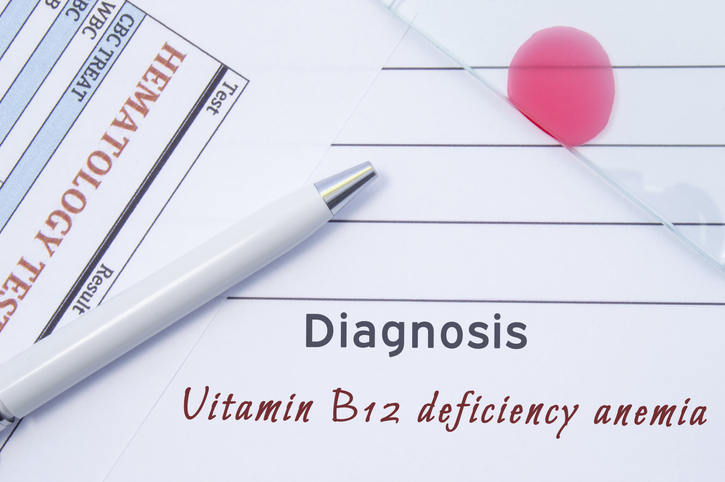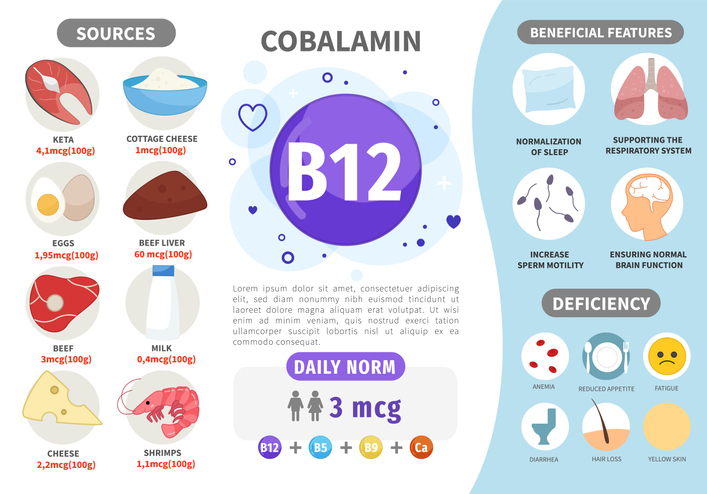Another Severe B12 Deficiency Makes The News. Don’t Let This Happen To You.

By Joy Stephenson-Laws, JD, Founder
“You are what you eat” is a popular saying. I would like to modify that saying a bit to, “You are what you eat and supplement.” The reality is that even if we maintain a balanced, nutrient-rich diet, the majority of us will have nutrient deficiencies and/or imbalances. Although vitamin and mineral supplements should never be viewed as a replacement for nutritious, whole foods, they may play a key role in maintaining one’s health and wellness. This especially holds true for those who may be on a restrictive diet.
For example, a vegan diet can be beneficial because it usually includes a lot of nutrient-dense foods such as fruits, vegetables and legumes. Because this diet completely eliminates animal foods (eggs, dairy, meat, poultry and seafood), it is low in cholesterol but usually void of a very important nutrient – vitamin B12.
This vitamin is naturally present in animal foods. Although vegans can get some B12 from food items such as fortified plant milk and nori, they usually need to take a vitamin B12 supplement. If they don’t, the consequences can be quite serious.
I recently blogged about a young woman who wasn’t even vegan. She was vegetarian and suffered a severe B12 deficiency. The deficiency was so extreme that she could barely walk at one point.

Vitamin B12 (one of the eight B vitamins) serves many purposes in the body, such as helping make DNA and red blood cells (that carry oxygen to your organs and give you energy and help prevent fatigue). B12 also helps keep your brain and immune system healthy and plays a role in preventing a type of anemia called megaloblastic anemia, which may leave you feeling tired and weak. Not only is having sufficient B12 important for preventing and fighting disease and giving your body energy, but it may also play a major role in your mental health. This nutrient may even help prevent memory loss associated with aging.
Another young woman (who I suspect was vegan or consumed very few animal foods) experienced paresthesia (pins and needles sensation) in all of her limbs. I myself am mainly plant-based and have experienced this condition (in my calves and feet) from not getting enough B12.
“What’s more, people may not realize that vitamin B12 is missing from their diets because the liver can store a five-year supply in reserve. Without treatment, a deficiency can lead to mood swings or depressive symptoms, fatigue, gastric problems, muscle weakness, nerve damage and anemia,” according to Live Science.
Severe B12 deficiency can cause neurological issues and if left untreated, this can lead to irreversible damage.
I recently came across yet another story about severe B12 deficiency. According to one report, a vegan man who had been following a “strict” vegan diet for 20 years had such a severe B12 deficiency that he had trouble speaking and numbness and tingling in his arms. The man is only 39-years old, so he has been vegan pretty much half of his life. He experienced confusion and episodes of blurry vision.
“He also felt unbalanced, lightheaded, breathless, and more tired than usual, the health professionals, who work in Atlanta, said,” according to the report.
Furthermore, “Investigations revealed that the man had ‘undetectable’ vitamin B12 levels and depleted levels of red and white blood cells and platelets.”
Being vegan or vegetarian is not the issue. Not supplementing is.To state the obvious, he was not taking a supplement. But what I want people to understand is that by no means am I attempting to discourage people from following a vegan or vegetarian diet. I do, however, want to stress how crucial it is to undergo routine comprehensive nutrient tests (which are blood and urine tests) in order to determine any nutrient imbalances or deficiencies, take quality supplements per the advice of a competent healthcare practitioner and never ignore your symptoms.
The young man discussed had to undergo three blood transfusions and get daily B12 injections. It took two months for his blood test results to show normal B12 levels. Although his symptoms took some time to dissipate, he did not appear to suffer any permanent damage. The reality is that he could have suffered a heart attack or stroke.
I consider him very lucky. Maybe being younger saved him from even more serious consequences, but the point is that this all could have been avoided in the first place if he had made nutrient testing and supplementing key components of his proactive healthcare routine. I applaud someone who is able to maintain a vegan diet for so long. It is not easy, however, restrictive diets (as in diets that eliminate whole food groups) must be monitored and assisted with the guidance of a competent healthcare professional.
Always supplement in a safe manner.
Enjoy your healthy life!
Disclaimer: This article is not intended to provide medical advice. Please consult with your doctor or another competent healthcare practitioner to get specific medical advice for your situation.
The pH professional health care team includes recognized experts from a variety of health care and related disciplines, including physicians, attorneys, nutritionists, nurses, and certified fitness instructors. This team also includes the members of the pH Medical Advisory Board, which constantly monitors all pH programs, products, and services. To learn more about the pH Medical Advisory Board, click here.







